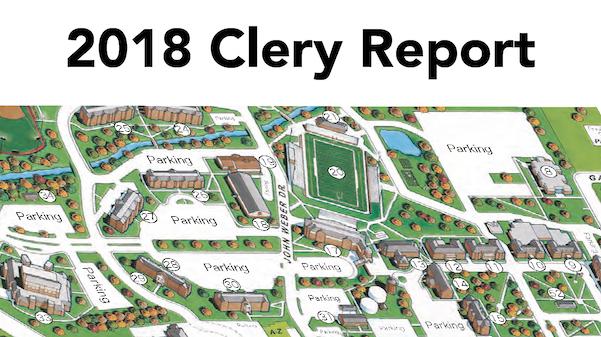KAYLA DRAKE | Editor-in-Chief
The annual Security and Fire Safety Report was released Monday, and while liquor law violations at Lindenwood went up in 2018, drug law violations were almost cut in half.
The report is released annually in accordance with the Clery Act, which mandates that any university receiving federal funds publicly display its annual crime statistics.
Jeanne Clery was a student at Lehigh University in Pennsylvania who was brutally raped and killed in her dorm room in 1986. Her parents then lobbied for crime statistics to be publicized on college campuses. The Clery Act was signed into law in 1990.
Clery Compliance Coordinator Jose Obando, who joined public safety in March last semester, said there has been an increase in drinking on campus. He attributes increased liquor law violations to campus house parties that have minors present.
Fall 2019 Director of Public Safety Ryan Anderson’s first semester at the St. Charles campus. Before, Anderson was the public safety director at the Belleville campus and a police officer in Illinois.
Anderson said, even though he hasn’t been on campus for long, liquor law violations statistically occur in non-traditional student housing, hence more violations at campus houses.
Drug violations took a downturn, but Anderson said that doesn’t necessarily mean there is more or less consumption of marijuana, amongst other drugs.
“It’s the mode of delivery [that has changed], so the vape pens,” Anderson said. “I wouldn’t even begin to imagine the different forms in which someone could consume [weed].”
Anderson said flavored vape pens make weed more disguised and harder for public safety officers to smell students smoking it.
Some of the results:
- Liquor law arrests increased from one in 2017, to seven in 2018.
- Liquor law violations took a small dive from 118 in 2016, to 91 in 2017, but increased again to 138 in 2018. The law violations are all minors. A policy violation at Lindenwood would be students above 21 years old in possession of alcohol, which are not included in the Clery report.
- Drug law arrests decreased from 24 in 2017, to 18 in 2018.
- Drug law violations were almost cut in half from 44 in 2017, to 25 in 2018.
- One weapons law violation and arrest happened in 2018, after an area coordinator’s husband, Christopher H. Thomas, assaulted her and “threatened her with a semi-automatic pistol in their Lindenwood campus residence” off Glenco Drive. The St. Charles Police Department made the arrest and Thomas has since been charged with a felony.
- Rape cases increased from six in 2017, to nine in 2018.
- Fondling cases increased from two in 2017, to three in 2018.
- Burglary, the unlawful entry of a structure to commit a crime, decreased from 14 in 2017, to eight in 2018.
- Motor vehicle theft decreased from five in 2017, to one in 2018.
- Dating violence cases decreased from five to four in 2018 and domestic violence stayed the same, with two reported instances in 2018.
- Stalking cases have increased from two in 2017, to four in 2018.
Definitions for these crimes can be found on page 98 of the report.
According to the report, these “crime statistics [were] compiled from reports submitted to Public Safety & Security, local police and trained campus security authorities,” like university faculty and staff.
Human Resources, Student Involvement, Residential Life, First-Year Programs and the Student Counseling and Resource Center also contributed to this report.
Public Security enforces “university policies outlined in the Lindenwood Student Handbook” and cannot make arrests, but can issue parking tickets and ask for identification if they have a safety concern.
In total, Public Security employs 20 officers, not including the director or assistant director, according to the report. The St. Charles City and County police handle the more serious crimes on campus.
Anderson said some increases of crimes in the Clery Report are a good thing in cases like sexual assaults, which are the most underreported crimes on college campuses. Therefore, more crimes showing up in the report may be an indication of a higher rate of reporting.
“There’s no golden ticket to having everything reported,” but Anderson said his officers can improve connection points and education of the student body to increase reporting.








